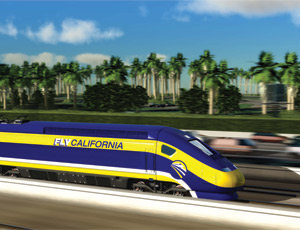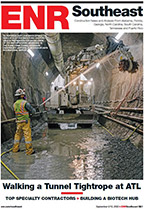Dovetailing with the U.S. Dept. of Transportation announcement that 24 states were vying for the $2.4 billion in high-speed-rail funds rejected by Florida Gov. Rick Scott (R), public transit advocates on April 6 released a report contending that high-speed and intercity passenger rail projects will stimulate construction, manufacturing-sector and long-term job growth.

According to the report, for each $1 billion invested in HSR projects, 24,000 jobs would be created. Kevin McFall, senior vice president with Stacy and Witbeck Inc., Alameda, Calif., a general contractor, called transit and high-speed-rail projects a “shot in the arm” at a press briefing.
“I have had firsthand exposure to the benefits of these kind of projects in the communities in which we build them,” McFall says.
The report, “The Case for Business Investment in High-Speed and Intercity Passenger Rail,” was conducted by the Economic Development Research Group for the U.S. Conference of Mayors, a non-partisan association representing U.S. cities with populations exceeding 30,000.
High-speed-rail ridership has doubled globally in the past decade and is expected to double again, says Charles Wochele, vice president for industry and government relations at Alstom Transport, a train manufacturer in Paris.
But when the first Paris-Lyon line was built in 1970 during a European recession, it initially met with the same resistance that HSR is now facing in the U.S., he says. Four decades later, there are almost 2,600 miles of HSR in Europe. “I don't understand why it has become so politicized,” he adds.
In addition to Florida's Scott, Republican governors in other states, including Ohio and Wisconsin, have played to their political power base by rejecting federal HSR funing.
On the other hand, William Millar, American Public Transportation Association, president notes that, out of the 24 states vying for the rejected Florida rail funds, 11 are governed by Republicans.
The new federal budget has a $1.5-billion funding cut looming, but the U.S. Dept. of Transportation on April 11 announced more than $300 million in obligated grants for high-speed intercity rail corridors. Some 2,000 private-sector representatives were scheduled to attend a meeting with California HSR officials on April 12.



Post a comment to this article
Report Abusive Comment